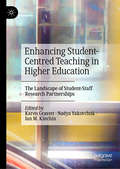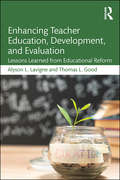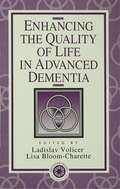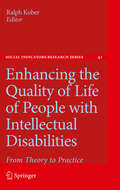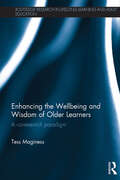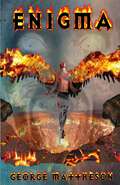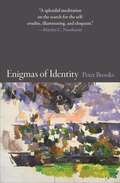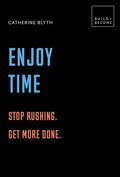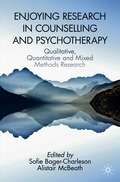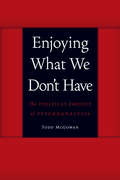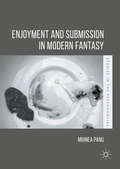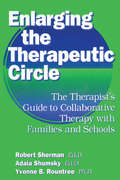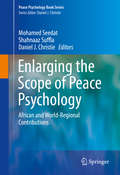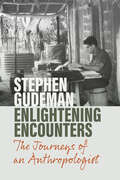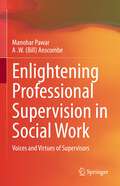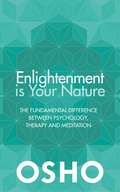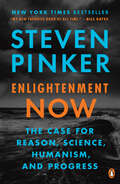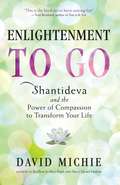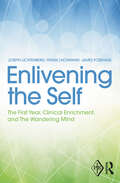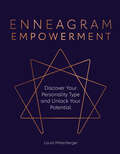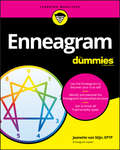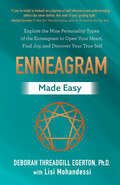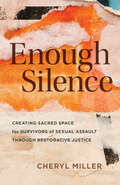- Table View
- List View
Enhancing Student-Centred Teaching in Higher Education: The Landscape of Student-Staff Research Partnerships
by Ian M. Kinchin Karen Gravett Nadya YakovchukThis book explores student-staff partnerships through a breadth of co-authored research projects. There is a significant gap in current literature regarding student-staff partnerships, both in the sharing of examples as well as in the examination of partnership working and its impact. Organised into four thematic sections, the editors and contributors highlight the diversity of routes students and staff can take to work in partnership, as well as how research, learning and teaching can be co-created. Written by both university staff and student researchers, the chapters consider the benefits of student-staff partnerships as an antidote to consumerist visions of higher education, and a way of celebrating the potential of students and their voices. This book will be of interest and value to scholars of student-staff partnerships.
Enhancing Teacher Education, Development, and Evaluation: Lessons Learned from Educational Reform
by Thomas L. Good Alyson L. LavigneEnhancing Teacher Education, Development, and Evaluation examines the complex role that recent educational reforms have played in the teaching profession. The failure of programs like Race to the Top to benefit teaching and learning outcomes has yielded many questions about what went wrong and how a research-based plan for true systemic progress could actually work. Covering inaccurate narratives about schools and student achievement, evidence for teacher effectiveness, and the history and repercussions of Race to the Top, this book culminates with a proposal for future research and policy initiatives that more accurately and more equitably prioritize the measurement and improvement of teaching and learning. Five concise yet comprehensive chapters invite teacher and principal educators, teachers and school leaders in training, district administrators, policymakers, and other stakeholders to better understand the implications of and possible paths beyond misguided reform efforts. An overview of the recent past and an inspiration for the immediate future, this definitive analysis offers insights into how more reasonable, empirically derived strategies will ultimately foster more successful schools.
Enhancing the Quality of Learning
by John R. Kirby Michael J. LawsonHigh quality learning is extensive, well integrated, deep, and supports the use of knowledge in new situations that require adaptation of what has been learned previously. This book reviews current research on the nature of high quality learning and the factors that facilitate or inhibit it. The book addresses relationships between quality of learning and learners' dispositions, teaching methods, cognitive strategies, assessment and technologies that can support learning. The chapters provide theoretical analyses, reports of classroom research, and suggestions for practical application for both teachers and learners. The book will be of value to teachers at all levels of education and provides guidance for students about how to approach classroom tasks in order to develop high quality learning.
Enhancing the Quality of Life in Advanced Dementia
by Ladislav Volicer Lisa Bloom-CharettePublished in 1999, Enhancing the Quality of Life in Advanced Dementia is a valuable contribution to the field of Psychotherapy.
Enhancing the Quality of Life of People with Intellectual Disabilities
by Ralph KoberThis book contains a series of articles, written by international experts in the fields of intellectual disability and quality of life, that explore a broad range of issues that impact on the quality of life of people with intellectual disabilities and their families. The book commences with a general discussion on defining quality of life and family quality of life and the appropriateness of using these constructs in the field of intellectual disability, and is followed by an analysis on the effects of living arrangements and employment on quality of life. The book concludes with discussions on the unique issues facing children with intellectual disabilities and people living in developing countries and the effect these issues have upon their quality of life.
Enhancing the Wellbeing and Wisdom of Older Learners: A co-research paradigm (Routledge Research in Lifelong Learning and Adult Education)
by Tess MaginessEnhancing the Wellbeing and Wisdom of Older Learners: A Co-research Paradigm examines how lifelong learning, becoming wise, and sharing wisdom are integrally linked to older people’s wellbeing. The book highlights appropriate learning styles and pedagogies for older people, including research models emphasising participation, and offers recommendations for research in lifelong learning with the potential to effect change. Focusing upon a collaborative action research project, ‘Sagaciation’, chapters explore the involvement of older learners in the design and delivery of the scheme, which enabled them to expand their knowledge and skills, and to fully engage as critical and creative voices in a supportive and welcoming environment. The book offers an account of the process of the action research, as well as its findings. The project is set into the context of leading academic thinking on fields such as the growth of an ageing population, the rise of literature on ageing, negative and positive constructions of ageing, social gerontology, the wellbeing and health of older people, and educational gerontology. This book challenges negative representations of older people as a burden by offering a paradigm of hope, resilience, and sagacity within education and beyond. It will appeal to researchers, academics and postgraduate students in the fields of adult education, lifelong learning, gerontology, mental health and wellbeing, and the sociology of education, as well as to policymakers and those working with older people
Enigma
by George MatthesonIn this unique memoir, a diagnosed schizophrenic takes readers inside his experience of reality blending with hallucination.George Mattheson was born in Guyana and grew up in Trinidad and Tobago before settling in the United States. At age twenty-seven, he was diagnosed with schizophrenia and bipolar disorder. In Enigma, Mattheson shares his experience growing up talking to the Archangel Michael and providing intelligence to the CIA. For the son of intelligence operatives, the CIA was God and Washington, DC, was God&’s church. &“I have been experiencing the effects of stigmata lately, so I started to write this novel the best way I know how, by sharing both truth and fiction. For the truth, you&’ll have to find it on your own, but the fiction part is what I see in visions, memories, and dreams. It holds a hidden meaning for only the wise to decipher.&” —George Mattheson, from Enigma
Enigmas of Identity
by Peter BrooksFrom eminent critic Peter Brooks, an exploration of the modern preoccupation with identity"We know that it matters crucially to be able to say who we are, why we are here, and where we are going," Peter Brooks writes in Enigmas of Identity. Many of us are also uncomfortably aware that we cannot provide a convincing account of our identity to others or even ourselves. Despite or because of that failure, we keep searching for identity, making it up, trying to authenticate it, and inventing excuses for our unpersuasive stories about it. This wide-ranging book draws on literature, law, and psychoanalysis to examine important aspects of the emergence of identity as a peculiarly modern preoccupation.In particular, the book addresses the social, legal, and personal anxieties provoked by the rise of individualism and selfhood in modern culture. Paying special attention to Rousseau, Freud, and Proust, Brooks also looks at the intersection of individual life stories with the law, and considers the creation of an introspective project that culminates in psychoanalysis.Elegant and provocative, Enigmas of Identity offers new insights into the questions and clues about who we think we are.
Enjoy Time: Stop Rushing. Get More Done. (Build + Become)
by Catherine BlythGain a better understanding of the nature of time and learn how to manage your time and improve your life.We are living longer than ever and, thanks to technology, we are able to accomplish so much more. So why do we feel time poor? In twenty eye-opening lessons, Catherine Blyth combines cutting-edge science and psychology to show why time runs away from you, then provides the tools to get it back.Learn why the clock speeds up just when you wish it would go slow, how your tempo can be manipulated and why we all misuse and miscalculate time. But you can beat the time thieves. Reset your body clock, refurbish your routine, harness momentum and slow down. Not only will time be more enjoyable, but you really will get more done.
Enjoying Research in Counselling and Psychotherapy: Qualitative, Quantitative and Mixed Methods Research
by Sofie Bager-Charleson Alistair McBeathThis textbook provides a guide to the development of a rigorous and creative research-supported practice for students, practitioners, and researchers in counselling and psychotherapy. With an emphasis on critical thinking and “research mindedness”, it introduces practical research skills and links them to self-awareness and critical reflection. Learning how to creatively and effectively use oneself in the treatment process is an essential component in therapy training and this level of self-awareness has long been a neglected area in research – until now. With examples ranging from private therapeutic practice to psychiatric related research, each chapter combines ‘how-to-do-it’ advice with illustrative real-life examples. The authors outline the use of a broad range of research methods, embracing Arts- as well as RCT-based research, and covering qualitative, quantitative, pluralistic and mixed methods approaches. Whether you are engaging with research for the first time or already developing your own research projects, if you are a student at diploma level or taking a Postgraduate research course for counsellors, psychotherapists and counselling psychotherapists, this is essential reading for anyone looking for a book that combines self-awareness with analytical and practical skills.
Enjoying What We Don't Have: The Political Project of Psychoanalysis (Symploke Studies in Contemporary Theory)
by Todd McGowanAlthough there have been many attempts to apply the ideas of psychoanalysis to political thought, this book is the first to identify the political project inherent in the fundamental tenets of psychoanalysis. And this political project, Todd McGowan contends, provides an avenue for emancipatory politics after the failure of Marxism in the twentieth century.Where others seeking the political import of psychoanalysis have looked to Freud&’s early work on sexuality, McGowan focuses on Freud&’s discovery of the death drive and Jacques Lacan&’s elaboration of this concept. He argues that the self-destruction occurring as a result of the death drive is the foundational act of emancipation around which we should construct our political philosophy. Psychoanalysis offers the possibility for thinking about emancipation not as an act of overcoming loss but as the embrace of loss. It is only through the embrace of loss, McGowan suggests, that we find the path to enjoyment, and enjoyment is the determinative factor in all political struggles—and only in a political project that embraces the centrality of loss will we find a viable alternative to global capitalism.
Enjoyment and Submission in Modern Fantasy
by Mihnea PanuThis book reveals the workings of the bourgeois passion for submission in a variety of contemporary contexts. By (re)introducing the concept 'bourgeois' as an analytical term and describing this contemporary subject as a psychic economy rather than just as a social class, Panu shows the intractability of contemporary forms of enjoyment and neoliberalism's periodic outbursts of aggressiveness to be connected by a recurrent circuit of trauma and anxiety originating in the bourgeois subject's difficult relationship with symbolic authority. So far, most anticapitalist and decolonial struggles in the West have been hesitant when engaging with the issue of bourgeois enjoyment as the main source of capitalism's resilience. This exciting new work draws on an extensive range of theorists such as Butler, Copjec, Žižek and Zupancic to emphasise the importance of psychological mechanisms irreducible to rationality or knowledge such as desire, enjoyment, and the obscure nature of selfhood in the reiteration of the current capitalist reality.
Enlarging The Therapeutic Circle: The Therapist's Guide To Collaborative Therapy With Families & School
by Robert Sherman, Ed.D. Adala Shumsky, Ed.D. Yvonne B. Roundtree, Ph.D.First published in 1995. Routledge is an imprint of Taylor & Francis, an informa company.
Enlarging the Scope of Peace Psychology
by Mohamed Seedat Shahnaaz Suffla Daniel J. ChristieWith the major goal of building an inclusive international community that promotes peace-related research and action, this volume reflects on local, national and global peace engagement and works towards transdisciplinary understandings of the role of psychology in peace, conflict, and violence. Drawn primarily from 14th Biennial International Symposium on the Contributions of Psychology, the chapters focus on peacemaking--or the pursuit of harmony in human relations-- and peacebuilding--or equity in human relations-- with a special emphasis on voices from typically underrepresented areas in psychology, such as the Global South. In order to move beyond a Western-centered idea of peace psychology, the volume is divided into two major parts. The first half of the volume puts an emphasis on peace psychology research and praxis in a number of geohistorical contexts, including Malaysia, Northern Ireland, Thailand, and Kashmir, that bear on conflict, harmony and equity in human relations. Chapters in the second half of the volume fulfill the mandate of Biennial Symposia; namely, to create more equity in the production of peace theory and praxis by bringing forward the voices of scholars and change agents that are often unheard in peace discourses, including a number of scholars and chapters from South Africa. Additionally, throughout the chapters, the authors and editors of the volume emphasize emancipatory agendas as an important alternative to militarism and state-sponsored violence. With the aim of bringing forward voices from cultures and situations that are typically not included or highly visible in peace discourses, Enlarging the Scope of Peace Psychology in Invited and Invented Spaces: African and World-Regional Contributions is a thought-provoking, timely, and informative work. Psychologists, anthropologists, sociologists, political scientists, activists, public-policy makers, and all those interested in promoting peace and justice, are sure to find this an invaluable and illuminating resource.
Enlightening Encounters: The Journeys of an Anthropologist
by Stephen GudemanOne of the world's top anthropologists recounts his formative experiences doing fieldwork in this accessible memoir ideal for anyone interested in anthropology. Drawing on his research in five Latin American countries, Steve Gudeman describes his anthropological fieldwork, bringing to life the excitement of gaining an understanding of the practices and ideas of others as well as the frustrations. He weaves into the text some of his findings as well as reflections on his own background that led to better fieldwork but also led him astray. This readable account, shorn of technical words, complicated concepts, and abstract ideas shows the reader what it is to be an anthropologist enquiring and responding to the unexpected. From the Preface: Growing up I learned about making do when my family was putting together a dinner from leftovers or I was constructing something with my father. In fieldwork I saw people making do as they worked in the fields, repaired a tool, assembled a meal or made something for sale. Much later, I realized that making do captures some of my fieldwork practices and their presentation in this book.
Enlightening Professional Supervision in Social Work: Voices and Virtues of Supervisors
by Manohar Pawar A .W. AnscombeThis book is a response to the felt need of social work practitioners for professional supervision. Reflecting on the social work profession in the context of contemporary socio-economic and political challenges and wide-ranging organizational and practice settings, the book provides a voice for supervisors to share their experiences. Social workers often deal with difficult, undefined and unique human situations where there are no ready-made solutions or quick fixes. This constant and complex working process can cause stress, burnout and affect their quality of work and judgement if they are not supported appropriately and in a timely way. One such support to them is offering professional supervision to enhance their professional functioning and their quality of service. On the one hand, the narratives of experienced supervisors reveal critical dilemmas, core processes and content, expectations, issues posed, and concepts and theories employed in professional supervision, and on the other, the wisdom and qualities of supervisors. This book analyzes concepts and models employed by supervisors and the complex interaction of their qualities and wisdom that arise from their narratives. It underscores the supervisee's being through integrating the personal and professional self to deliver better quality services to people, agencies, and communities. The book argues that the current trends compel action for well thought through professional supervision for all who need it. Those interested in professional supervision – supervisees, practitioners, and supervisors – will benefit from reading this book. Enlightening Professional Supervision in Social Work: Voices and Virtues of Supervisors is the resource that both supervisors and practitioners need to create safe environments to carefully reflect, develop knowledge, sharpen skills and effectively engage in practice. It will improve services to clients and organizational service provision, and not only benefit both practitioners and supervisors in social work and human services, but also social work educators and students, social policy administrators as well as managers and trainers in the social services sector.
Enlightenment Is Your Nature: The Fundamental Difference Between Psychology, Therapy, and Meditation
by Osho"Enlightenment” in Western cultures has long been associated with the 18th century movement that brought about a new “age of reason.” As Zen, Buddhism, and other eastern wisdom traditions have captured the imagination of the West, “enlightenment” has come to be known as a specific state of consciousness attained by an individual on a spiritual or meditative path.However, the Judeo-Christian context, with its belief in a divine power “out there” and separate from the individual, hinders most Westerners’ ability to comprehend “enlightenment” in the Eastern sense. Our theistic conditioning leads to such common misunderstandings as perceiving enlightenment as the attainment of supernatural powers, or as something achievable only by those who are somehow “special.”In this work, Osho deconstructs these misunderstandings and offers a radically different view of enlightenment, freed from all spiritual and religious beliefs – including the distortions of asceticism and renunciation that have arisen in Eastern and Western cultures both.Taking the reader step by step through the history of how both East and West have approached the mysteries of the human mind and spirituality, Osho offers a simple science of consciousness that he calls “the psychology of the buddhas.” It is a science that in very clear terms shows how one can, through awareness and taking full responsibility for one’s life, go beyond all limited belief systems, habits, and superstitions of the mind. That process, he says, brings us back to our nature – and that is enlightenment.
Enlightenment Now: The Case for Reason, Science, Humanism, and Progress
by Steven Pinker<P> If you think the world is coming to an end, think again. Steven Pinker presents the big picture of human progress: people are living longer, healthier, freer, and happier lives, and while our problems are formidable, the solutions lie in the Enlightenment ideal of using reason and science.Is the world really falling apart? Is the ideal of progress obsolete? <P> In this elegant assessment of the human condition in the third millennium, cognitive scientist and public intellectual Steven Pinker urges us to step back from the gory headlines and prophecies of doom, which play to our psychological biases. <P>Instead, follow the data: In seventy-five jaw-dropping graphs, Pinker shows that life, health, prosperity, safety, peace, knowledge, and happiness are on the rise, not just in the West, but worldwide. This progress is not the result of some cosmic force. It is a gift of the Enlightenment: the conviction that reason and science can enhance human flourishing.Far from being a naïve hope, the Enlightenment, we now know, has worked. But more than ever, it needs a vigorous defense. <P>The Enlightenment project swims against currents of human nature--tribalism, authoritarianism, demonization, magical thinking--which demagogues are all too willing to exploit. Many commentators, committed to political, religious, or romantic ideologies, fight a rearguard action against it. The result is a corrosive fatalism and a willingness to wreck the precious institutions of liberal democracy and global cooperation. With intellectual depth and literary flair, Enlightenment Now makes the case for reason, science, and humanism: the ideals we need to confront our problems and continue our progress. <P><b>A New York Times Bestseller</b>
Enlightenment to Go
by David MichieEssential reading for those seeking life-changing psychological tools and transcendent wisdom, Enlightenment to Go provides a lively and accessible introduction to the 'best of' Shantideva. With warmth, humor, and stories of his own experiences, author David Michie shows how modern psychological science confirms Shantideva's insights, and he explores powerful antidotes to contemporary problems, including stress, anxiety, and depression. Whether you are a newcomer to Buddhism or a seasoned practitioner, Enlightenment to Go offers a glimpse of a radiantly different reality right here in your busy life.
Enlivening the Self: The First Year, Clinical Enrichment, and The Wandering Mind (Psychoanalytic Inquiry Book Series)
by Joseph D. Lichtenberg Frank M. Lachmann James L. FosshageIn psychoanalysis, enlivenment is seen as residing in a sense of self, and this sense of self is drawn from and shaped by lived experience. Enlivening the Self: The First Year, Clinical Enrichment, and the Wandering Mind describes the vitalizing and enrichment of self-experience throughout the life cycle and shows how active experience draws on many fundamental functional capacities, and these capacities come together in support of systems of motivation; that is, organized dynamic grouping of affects, intentions, and goals. The book is divided into three essays: Infancy – Joseph Lichtenberg presents extensive reviews of observation and research on the first year of life. Based on these reviews, he delineates twelve foundational qualities and capacities of the self as a doer doing, initiating and responding, activating and taking in. Exploratory therapy – James L. Fosshage looks where therapeutic change is entwined with development. There are many sources illustrated for enhancing the sense of self, and Frank M. Lachmann pays particular attention to humor and to the role that the twelve qualities and capacities play in the therapeutic process. The wandering mind – Frank M. Lachmann covers the neuroscience and observation that "mind wandering" is related to the immediacy of the sense of self linking now with past and future. Throughout the book the authors’ arguments are illustrated with rich clinical vignettes and suggestions for clinical practice. This title will be a must for psychoanalysts, including trainees in psychoanalysis, psychiatry residents and candidates at psychoanalytic institutes and also graduate students in clinical and counselling psychology programs.
Enneagram Empowerment: Discover Your Personality Type and Unlock Your Potential
by Laura MiltenbergerUnlock your inner potential with the enneagram.The enneagram, a personality assessment tool with sacred roots, offers an opportunity to improve your life and relationships through self-awareness and understanding of others. Based on nine core personality types, the enneagram reveals how your personality type and its associated traits can influence your relationships, work habits, and goals. With simple explanations and illustrations, Enneagram Empowerment gives you the tools to transform. • Identify your enneagram type • Learn about the defining characteristics of each type • Find out how your personality traits can influence your daily habits and interactions • Discover how to embrace the strengths of your type and overcome your weaknesses • Improve your relationships by deepening your understanding of others<
Enneagram For Dummies
by Jeanette van StijnDiscover who you are and unlock your potential with the power of the EnneagramFans of Myers Briggs, The Five Love Languages, and Everything DiSC are loving the Enneagram test. The Enneagram is a personality typing system that describes patterns in how people interpret the world, manage their emotions, and experience their inner lives. The Enneagram describes nine different personality types and maps each of these types on a nine-pointed diagram to illustrate how each type relates to one another. From bestselling books, popular podcasts, online courses, workshops, even around the dinner table, the Enneagram is having a moment and is likely here to stay.But what does your number represent? Are you a three, a seven, a nine, or something in between? And how do you use your Enneagram number to better relate to loved ones, friends, and colleagues? Enneagram For Dummies is here to help. Written by Enneagram expert and author Jeanette van Stijn, Enneagram For Dummies offers a step-by-step approach for using the Enneagram as a tool for personal transformation and development.You'll discover: Which Enneagram type best matches your personality Advice on overcoming challenges that your personality type often faces Interpersonal skills you should develop to succeed with people of other Enneagram personality types Ways to use your knowledge of Enneagram types to navigate the twists and turns of the workplace How the Enneagram aligns itself with many of the world's spiritual traditions Whether you're the Helper, the Investigator, the Peacemaker, or another personality type altogether, Enneagram For Dummies shows you how to overcome your inner barriers, recognize your unique gifts and strengths, and truly connect with the world around you.
Enneagram Made Easy: Explore the Nine Personality Types of the Enneagram to Open Your Heart, Find Joy, and Discover Your True Self
by Deborah Threadgill Egerton&“Deborah Egerton is one of the world&’s leading experts on the Enneagram, but more importantly she brings this information with such deep compassion and a fierce love for all of humanity.&” Colette Baron-Reid, spiritual medium, acclaimed oracle expert, and best-selling author of The MapThe Enneagram is an archetypal personality system that identifies nine distinct types, each with its own set of characteristics, motivations, and patterns of behavior. In this book, Dr. Deborah Threadgill Egerton, globally respected psychotherapist and president of the International Enneagram Association, will help you to explore all facets of the Enneagram and provide a deeper dive into each of the nine personality archetypes:The Idealist | The Helper | The Achiever |The Individualist | The Investigator | The Loyalist |The Enthusiast | The Challenger | The PeacemakerDr. E., as she is affectionately called, will guide you through the profound potential of the Enneagram as a transformative mechanism for change. You&’ll explore the depths of your personality structure, harnessing these insights to navigate conflicts, fortify relationships, and elevate your energetic frequency and emotional intelligence to new levels.&“Dr. E. has not only helped me understand the Enneagram but has also supported me in applying its healing principles to my life and relationships. I had been thinking to myself &‘I wish everyone could have a Dr. E.&’—and now with Enneagram Made Easy, you can!&”Kyle Gray, best-selling author of Raise Your Vibration and Angel Prayers
Enneagram in Real Life: Find Your Type, Understand Who You Are, and Take Steps Toward Growth (EnneagramIRL #1)
by Stephanie Barron HallCertified Enneagram coach Stephanie Barron Hall shows you how to use the Enneagram as a tool for self-discovery and a practical way to achieve growth. Stephanie Barron Hall is using social media to bring the power of the Enneagram to a new generation of followers, teaching them how to successfully move beyond understanding to practical application—how to actually make changes in their own lives.In Enneagram in Real Life, Hall explains how to apply the Enneagram to your life. Finding your type is just the beginning of your story. Drawn from her years of study and practice coaching thousands of people, Enneagram In Real Life includes relatable stories from real clients, tangible growth practices and frameworks, and actionable advice you can use to incorporate the Enneagram’s transformative power into your life, career, communication, and relationships.
Enough Silence: Creating Sacred Space for Survivors of Sexual Assault through Restorative Justice
by Cheryl MillerLearn how restorative justice can offer healing to survivors of sexual abuse in your faith community Clara was five years old the first time she was raped by her father. The trauma stifled Clara&’s self-esteem, ability to trust others, and emotional regulation well into adulthood. But after an encounter with a repentant man who had committed the same crime against his own daughter—through a guided victim-offender dialogue—Clara was finally able to breathe. In Enough Silence, Cheryl Miller draws on more than two decades working with survivors of abuse to create the composite character of Clara. Her story represents countless real people in our faith communities living with a personal history of sexual trauma. Clara&’s story illustrates how restorative justice practices—implemented with care—can transform the lives of survivors. These practices include • holding offenders accountable, • lending direct voice to survivors, offenders, and members of the community, • taking into account all those with stakes in incidents of sexual abuse, • clarifying the organization&’s values, and • establishing a safe and structured environment for survivors. She also offers a road map for implementing victim-offender dialogue, surrogate dialogue, circles, and more. Enough Silence issues a call to pastors, clergy, nonprofit professionals, and other leaders to dismantle patriarchal systems that perpetuate rape culture. By embracing restorative justice practices, faith communities can imitate Christ in ministering to survivors and those who love them.
